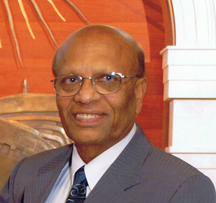Our education must also concern itself with Jeevan Vigyaan (the art and science of living). Beyond philosophy, understanding pooja, worship, and rituals, we must also teach and learn how to practice the teachings, doctrines, and Jain way of life in our daily, active life such as in business and professions. This is Applied Jainism. This is walking the talk. This is what Gandhi-ji (by his own practice and example) showed and offered to the world.
Today, the areas and developments in law, business, medicine, organ transplant, cloning, environment, ecology, DNA, stem cell, and genome research, issues of bioethics and abortion, the spread of new diseases, food production, transportation, space initiatives, and local and global conflicts have created new environments and needs and Jainism must research, debate, and seek to offer new, practical, and timely solutions to these urgent and vexing challenges.
Business leaders not only have to make profits for their corporations, but they also have societal responsibilities. When making decisions, a businessperson must be aware of the impact on society, the environment and ecology, the creation or prevention of pollution, human relations, employees, fellow workers, and a regard for openness, honesty in transactions, good job creations, and many other issues and concerns of the society as a whole. A business leader is part of the society in which he lives and his overarching role is to make that society better. Similarly, a doctor, a lawyer, an engineer, a certified public accountant, or a financial securities broker must weigh his decisions using the yardstick of ethics and responsibility to the society.
An Ahimsa Crisis: You Decide: The Need For Applied Jainism And Jeevan Vigyaan (The Art & Science Of Living)
Author:
 Dr. Sulekh Chand Jain
Dr. Sulekh Chand Jain
 Dr. Sulekh Chand Jain
Dr. Sulekh Chand Jain
Published: 09.09.2016
Sources
 Title: An Ahimsa Crisis You Decide
Title: An Ahimsa Crisis You DecideAuthor: Sulekh C. Jain
Edition: 2016, 1st edition
Publisher: Prakrit Bharati Academy, Jaipur, India
Page glossary
Some texts contain footnotes and glossary entries. To distinguish between them, the links have different colors.
Page statistics
This page has been viewed 994 times.